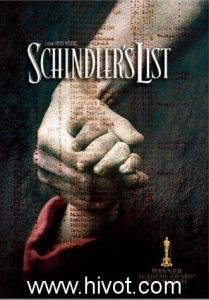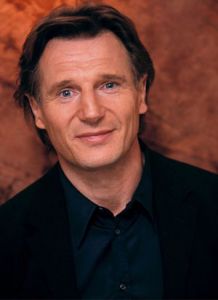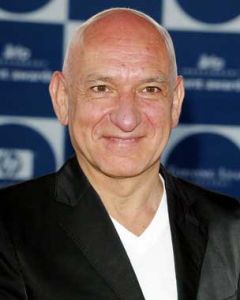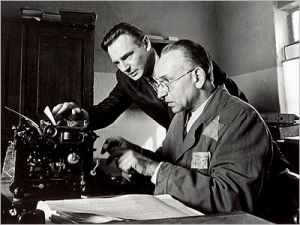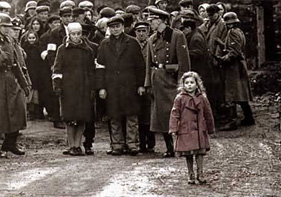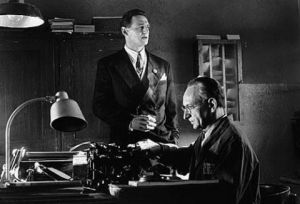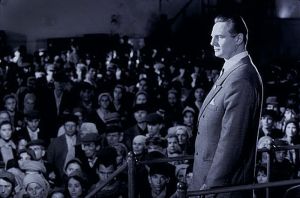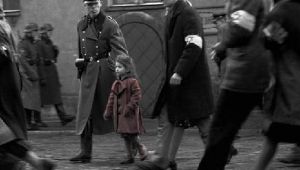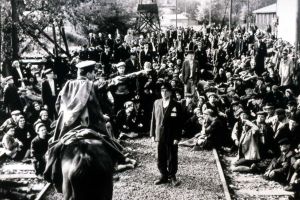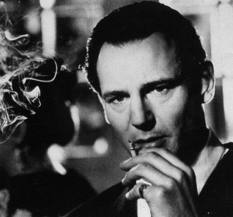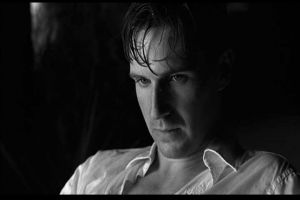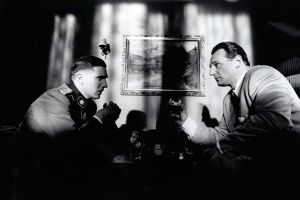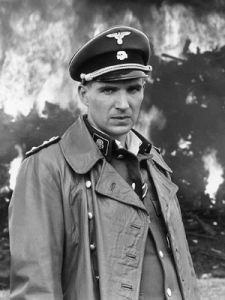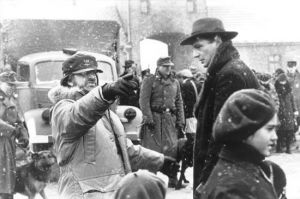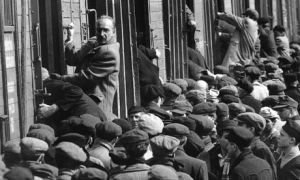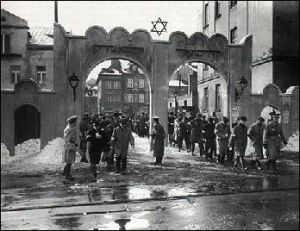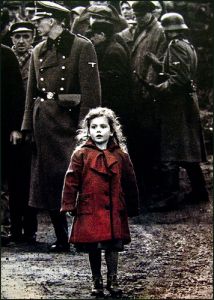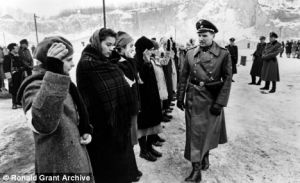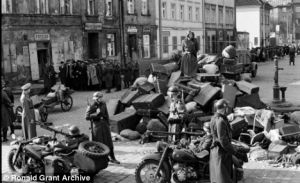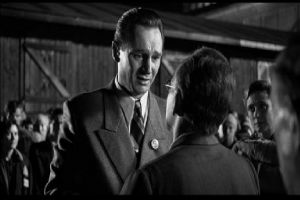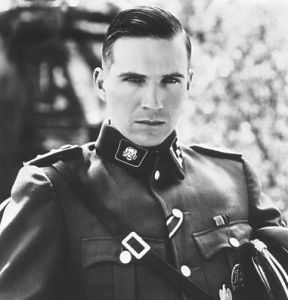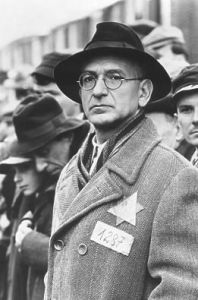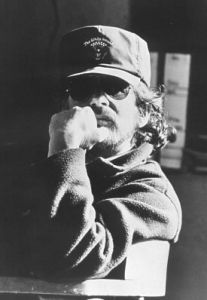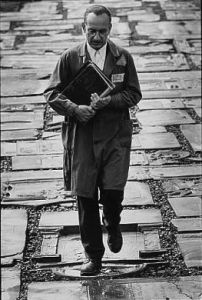Schindler's List
Schindler's List (辛德勒名单) is a 1993 American war-drama film directed by Steven Spielberg and based on the novel Schindler's Ark by Thomas Keneally. The film is about Oskar Schindler, a German businessman who saved the lives of more than a thousand Polish Jewish refugees during the Holocaust by employing them in his factories.
Directed by: Steven Spielberg
Produced by: Steven Spielberg, Gerald R. Molen, Kathleen Kennedy, Branko Lustig
Written by: Steven Zaillian
Music by: John Williams
Cinematography: Janusz Kamiński
Editing by: Michael Kahn
Studio: Amblin Entertainment
Distributed by: Universal Pictures
Release dates:
30 November 1993 (premiere: DC)
1 December 1993 (NYC)
9 December 1993 (LA)
15 December 1993 (US general)
25 December 1993 (Canada)
10 February 1994 (Australia)
18 February 1994 (UK)
3 March 1994 (Germany)
4 March 1994 (Poland)
Running time: 195 minutes
Country: United States
Language: English, Hebrew, German, Polish, French
Color: Black and White, Color
Genre: Biography Drama History War
Liam Neeson as Oskar Schindler, a German businessman who saves the lives of over 1,200 Jews by employing them in his factory.
Ben Kingsley as Itzhak Stern, Schindler's accountant and business partner.
Ralph Fiennes as Amon Göth, the main antagonist in the film. Göth is an SS (Schutzstaffel 纳粹党卫军)officer assigned to build and run the Póaszów concentration camp, and is befriended by Schindler, though he grows steadily suspicious of Schindler's true aims as the film progresses.
Embeth Davidtz as Helen Hirsch, a young Jewish woman whom Göth takes to work as his housekeeper, and finds attractive.
Caroline Goodall as Emilie Schindler, Schindler's wife.
Jonathan Sagall as Poldek Pfefferberg, a young man who survives with his wife, and provides goods to Schindler from the black market.
Ezra Dagan as Rabbi Lewartow, a rabbi who acquires skills as a welder in Schindler's camp.
Malgoscha Gebel as Wiktoria Klonowska, Shindler's mistress
Shmuel Levy as Wilek Chilowicz
Mark Ivanir as Marcel Goldberg
Béatrice Macola as Ingrid
Andrzej Seweryn as Julian Scherner
Friedrich von Thun as Rolf Czurda
Krzysztof Luft as Herman Toffel
Harry Nehring as Leo John
Norbert Weisser as Albert Hujar
Adi Nitzan as Mila Pfefferberg, Poldek's Wife.
Michael Schneider as Juda Dresner
Miri Fabian as Chaja Dresner
Anna Mucha as Danka Dresner
Ben Darby as Man in Grey
Albert Misak as Mordecai Wulkan
Hans-Michael Rehberg as Rudolf Hoess
Daniel Del Ponte as Dr. Josef Mengele
The relocation of Polish Jews from surrounding areas to the Kraków Ghetto in late 1939, shortly after the beginning of World War II. Meanwhile, Oskar Schindler (Liam Neeson), an ethnic German businessman from Moravia, arrives in the city in hopes of making his fortune as a war profiteer. Schindler, a member of the National Socialist Party, lavishes bribes upon the Wehrmacht and SS officials in charge of procurement. Sponsored by the military, Schindler acquires a factory for the production of army mess kits. Not knowing much about how to properly run such an enterprise, he gains a close collaborator in Itzhak Stern (Ben Kingsley), an official of Krakow's Judenrat (Jewish Council) who has contacts with the Jewish business community and the black marketers inside the Ghetto. They lend him the money for the factory in return for a small share of products produced. Opening the factory, Schindler pleases the Nazis and enjoys his newfound wealth and status as "Herr Direktor", while Stern handles all administration. Schindler hires Jewish Poles instead of Catholic Poles because they cost less (the workers themselves get nothing; the wages are paid to the SS). Workers in Schindler's factory are allowed outside the ghetto, and Stern falsifies documents to ensure that as many people as possible are deemed "essential" to the German war effort, which saves them from being transported to concentration camps, or being killed.
SS Captain Amon Göth (Ralph Fiennes) arrives in Krakow to initiate construction of the new Póaszów concentration camp. He orders liquidation of part of the ghetto and Operation Reinhard in Kraków begins, with hundreds of troops emptying the cramped rooms and murdering anyone who protests, appears uncooperative, elderly or infirm. In many cases, the killings were arbitrary. Schindler watches the massacre from the hills overlooking the area, and is profoundly affected. He nevertheless is careful to befriend Göth and, through Stern's attention to bribery, he continues to enjoy SS support and protection. During this time, Schindler bribes Göth into allowing him to build a sub-camp for his workers. Originally, his intentions are to continue making money, but as time passes, he begins ordering Stern to save as many lives as possible. As the war shifts, an order arrives from Berlin commanding Göth to exhume and destroy the remains of every Jew murdered in the Krakow Ghetto, dismantle Póaszów, and to ship the remaining Jews to the Auschwitz concentration camp.
At first, Schindler prepares to leave Kraków with his ill-gotten fortune. Then however, he prevails upon Göth to allow him to keep "his" workers, so that he can move them to a factory in his old home of Zwittau-Brinnlitz, in Moravia, away from the "final solution", now fully underway in occupied Poland. Göth acquiesces, but charges a massive bribe for each worker. Schindler and Stern assemble a list of workers who are to be kept off the trains to Auschwitz.
"Schindler's List" comprises these "skilled" inmates, and for many of those in Póaszów camp, being included means the difference between life and death. Almost all of the people on Schindler's list arrive safely at the new site. The train carrying the Jewish women is accidentally redirected to Auschwitz. There, the horrified women are taken to what they believe to be the gas chambers; but weep with joy when water falls from the showers. The day after, the women are shown waiting in line for work. In the meantime, Schindler rushes immediately to Auschwitz. Intending to rescue all the women, he bribes the camp commander, Rudolf Höß, with a cache of diamonds in exchange for releasing the women to Brinnlitz. However, a last minute problem arises just when all the women are boarding the train. Several SS officers attempt to hold back the children and prevent them from leaving. Schindler, however, insists that he needs their hands to polish the narrow insides of artillery shells. As a result, the children are released. Once the women arrive in Zwittau-Brinnlitz, Schindler institutes firm controls on the SS guards assigned to the factory, forbidding them to shoot or torture anyone. He permits the Jews to observe the Sabbath. In order to keep his factory workers alive, he spends much of his fortune bribing Nazi officials. Later, he surprises his wife while she is in the village church during mass, and tells her that she will now be the only woman in his life, a concession he had refused to grant previously. She goes with him to the factory to assist him. He runs out of money just as the Wehrmacht surrenders, ending the war in Europe.
As a Nazi Party member and a self-described "profiteer of slave labor", in 1945, Schindler must flee the advancing Red Army. Although the SS guards have been ordered to "liquidate" the Jews of Brinnlitz, Schindler persuades them to return to their families as men, not murderers. In the aftermath, he packs a car in the night, and bids farewell to his workers. They give him a letter explaining he is not a criminal to them, together with a ring secretly made from a worker's gold dental bridge and engraved with a Talmudic quotation, "Whoever saves one life saves the world entire." Schindler is touched but deeply ashamed, feeling he could have done more to save many more lives. Weeping, he considers how many more lives he could have saved as he leaves with his wife during the night.
The Schindler Jews, having slept outside the factory gates through the night, are awakened by sunlight the next morning. A Soviet dragoon arrives and announces to the Jews that they have been liberated by the Red Army. The Jews walk to a nearby town in search of food.
After a few scenes depicting post-war events and locations such as the execution of Amon Göth for war crimes, and a brief summary of what eventually happened to Schindler in his later years, the film returns to the Jews walking to the nearby town. As they walk abreast, the frame changes to one in color of the Schindler Jews in the present day at the grave of Schindler in Jerusalem. The film ends by showing a procession of now-elderly Jews who worked in Schindler's factory, each of whom reverently sets a stone on his grave. The actors portraying the major characters walk hand-in-hand with the people they portrayed, placing stones on Schindler's grave as they pass. The audience learns that at the time of the film's release, there were fewer than 4,000 Jews left alive in Poland, while there were more than 6,000 descendants of the Schindler Jews throughout the world. In the final scene, Liam Neeson (though his face is not visible) places a pair of roses on the grave and stands contemplatively over it.
The film concludes with a statement, "In memory of the more than six million Jews murdered"; the closing credits begin with a view of a road paved with headstones culled from Jewish cemeteries during the war (as depicted in the film), before fading to black.
In 1983, Thomas Keneally was hired to adapt his book, and he turned in a 220-page script. Keneally focused on Schindler's numerous relationships, and admitted he did not compress the story enough. Spielberg hired Kurt Luedtke, who adapted the screenplay of Out of Africa, to write the next draft. Luedtke gave up almost four years later, as he found Schindler's change of heart too unbelievable. During his time as director, Scorsese hired Steven Zaillian to write the script. When he was handed back the project, Spielberg found Zaillian's 115-page draft too short, and asked him to extend it to 195 pages. Spielberg wanted to focus on the Jews in the story. He extended the ghetto liquidation sequence, as he "felt very strongly that the sequence had to be almost unwatchable." He wanted Schindler's transition to be gradual and ambiguous, and not "some kind of explosive catharsis that would turn this into The Great Escape."
Liam Neeson auditioned as Oskar Schindler early in the casting process and was cast in December 1992, after Spielberg saw him perform in Anna Christie on Broadway. Warren Beatty participated in a script reading, but Spielberg was concerned that he could not disguise his accent and that he would bring "movie star baggage". Kevin Costner and Mel Gibson expressed interest in portraying Schindler. To prepare for the role, Neeson was sent tapes of Time Warner CEO Steve Ross, who had a charisma that Spielberg compared to Schindler's.
Ralph Fiennes was cast as Amon Göth after Spielberg viewed his performances in A Dangerous Man: Lawrence After Arabia and Emily Bront?'s Wuthering Heights. Fiennes put on 28 lbs (磅) to play the role. He watched historic newsreels and talked to Holocaust survivors who knew Göth. In portraying him, Fiennes said "I got close to his pain. Inside him is a fractured, miserable human being. I feel split about him, sorry for him. He's like some dirty, battered doll I was given and that I came to feel peculiarly attached to." Fiennes looked so much like Göth in costume that when Mila Pfefferberg, a survivor of the events, met him she trembled with fear.
Overall, there are 126 speaking parts in the film. Thirty thousand extras were hired during filming. Spielberg cast children of the Schindlerjuden for key Hebrew-speaking roles and hired Catholic Poles for the survivors. Often, German actors playing the SS would come to Spielberg and say, "Thank you for letting me resolve my (family) secrets by playing in your movie." Halfway during the shoot, Spielberg conceived the epilogue where 128 Schindlerjuden pay their respects to Schindler's grave in Jerusalem. The producers scrambled to find the people portrayed in the film.
Poldek Pfefferberg was one of the Schindlerjuden (roughly 1,000 to 1,200 Jews who were saved by Oskar Schindler during the Holocaust), and made it his life's mission to tell the story of his savior. Pfefferberg attempted to produce a biopic of Oskar Schindler with MGM in 1963, with Howard Koch writing, but the deal fell through. In 1982, Thomas Keneally published Schindler's Ark, which he wrote after he met Pfefferberg. MCA president Sid Sheinberg sent director Steven Spielberg a New York Times review of the book. Spielberg was astounded by the story of Oskar Schindler, jokingly asking if it was true. Spielberg expressed enough interest for Universal Pictures to buy the rights to the novel, and in early 1983 Spielberg met with Pfefferberg.
Spielberg was unsure of his own maturity in making a film about the Holocaust. Spielberg tried to pass the project to director Roman Polanski, who turned it down. Polanski's mother was killed at Auschwitz, and he had lived in and survived the Kraków Ghetto. Polanski eventually directed his own Holocaust film, The Pianist, in 2002. Spielberg also offered the film to Sydney Pollack, and Martin Scorsese, who was attached to direct Schindler's List in 1988. However, Spielberg was unsure of letting Scorsese direct the film, as "I'd given away a chance to do something for my children and family about the Holocaust." Spielberg offered him the chance to direct the 1991 remake of Cape Fear instead. Billy Wilder expressed interest in directing the film "as a memorial to most of [his] family, who went to Auschwitz."
Spielberg finally decided to direct the film after hearing of the Bosnian Genocide and various Holocaust deniers. With the rise of neo-Nazism after the fall of the Berlin Wall, he worried that people were too accepting of intolerance, as they were in the 1930s. In addition, Spielberg was becoming more involved with his Jewish heritage while raising his children. Sid Sheinberg greenlit the film on one condition: that Spielberg make Jurassic Park first.
Spielberg decided not to plan the film with storyboards, and to shoot the film like a documentary, looking to the documentaries. Forty percent of the film was shot with handheld cameras, and the modest budget of $25 million meant the film was shot quickly over seventy-two days. Such a style made Spielberg feel like an artist, as he limited his tools for a film he felt didn't have to be commercially successful. This matured Spielberg, who felt that in the past he had always been paying tribute to directors such as Cecil B. DeMille or David Lean. On this film, his shooting style was purely his own. He proudly noted that in this film, there were no crane shots.
The decision to shoot the film mainly in black and white lent to the documentary-style of cinematography, which cinematographer Janusz Kamiński compared to German Expressionism and Italian neorealism. Universal chairman Tom Pollock asked Spielberg to shoot the film in a color negative, to allow color VHS copies of the film to be sold, but Spielberg did not want "to beautify events." Black and white did present challenges to the color-familiar crew. Allan Starski, the production designer, had to make the sets darker or lighter than the people in the scenes, so they would not blend. The costumes had to be distinguished from skin tones or colors being used for the sets.
Shooting for Schindler's List began on March 1, 1993 in Kraków (Cracow), Poland, and continued for seventy-one days. The crew shot at the real life locations, though the P?aszów camp had to be reconstructed in a pit adjacent to the original site, due to post-war changes to the original camp. The crew was forbidden to enter Auschwitz, so they shot at a replica outside the camp. The Polish locals welcomed the filmmakers. There were some antisemitic incidents; anti-Semitic symbols scrawled on local billboards near shooting locations. An elderly woman mistook Fiennes for a Nazi and told him "the Germans were charming people. They didn't kill anybody who didn't deserve it", while Kingsley nearly entered a brawl with an elderly German-speaking businessman who insulted Israeli actor Michael Schneider. Nonetheless, Spielberg stated that at Passover, "all the German actors showed up. They put on yarmulkes and opened up Haggadas, and the Israeli actors moved right next to them and began explaining it to them. And this family of actors sat around and race and culture were just left behind."
Shooting Schindler's List was a deeply emotional time for Spielberg, as the subject matter forced him to confront elements of his childhood, such as the anti-semitism he faced. He was furious with himself when he did not "cry buckets" while visiting Auschwitz, and was one of many crew members who did not look on during shooting of the scene where aging Jews are forced to run naked while being selected by Nazi doctors to go to Auschwitz. Several actresses broke down when filming the shower scene, including one who was born in a concentration camp. Kate Capshaw and Spielberg's five children accompanied Spielberg on set, and he later thanked his wife "for rescuing me ninety-two days in a row...when things just got too unbearable." Spielberg's parents and his rabbi visited him on set. Robin Williams called Spielberg every two weeks to cheer him up with various jokes, because there was very little humor on set. Spielberg forwent a salary, calling it "blood money", and believed the film would flop.
Spielberg used German and Polish language in scenes to recreate the feeling of being present in the past, and used English to emphasize dramatic points. The director was interested in making the film entirely in German and Polish, but decided "there's too much safety in reading. It would have been an excuse to take their eyes off the screen and watch something else."
John Williams composed the score for Schindler's List. The composer was amazed by the film, and felt it would be too challenging. He said to Spielberg, "You need a better composer than I am for this film." Spielberg replied, "I know. But they're all dead!" Williams played the main theme on piano, and following Spielberg's suggestion, he hired Itzhak Perlman to perform it on the violin. In the scene where the ghetto is being liquidated by the Nazis, the folk song "Oyf'n Pripetshok is sung by a children's choir. The song was often sung by Spielberg's grandmother, Becky, to her grandchildren. The clarinet solos heard in the film were recorded by Klezmer virtuoso Giora Feidman.
The film opened in New York, Los Angeles, and Toronto on December 15, 1993. The film grossed $96.1 million in the United States and over $321.2 million worldwide. In Germany, over 5.8 million admission tickets were sold.
The film was released to DVD on March 9, 2004. The DVD was available in widescreen and fullscreen editions, both being a DVD-18 disc with the feature film beginning on side A and continuing on side B, along with the special features, which include a documentary introduced by Steven Spielberg. Also released for both formats was a limited edition gift set. The laserdisc gift set was a limited one, with only 10,000 copies manufactured. Besides the DVD, the set included the film's soundtrack, the original novel, and an exclusive photo booklet. Similar to the Laserdisc set, the DVD gift set included the widescreen version of the film, the original novel, the film's soundtrack on CD, a senitype, and a photo booklet titled Schindler's List: Images of the Steven Spielberg Film, all housed in a plexiglass case. The set has since been discontinued.
For the 1997 American television showing of the film, at Spielberg's insistence it aired unedited and nearly uncensored, although the sex scene was mildly edited by removing nearly all of the "thrusting". The film was preceded by a recorded introduction by Spielberg himself, explaining why the film was being aired nearly unedited. Senator Tom Coburn, then an Oklahoma congressman, stated that NBC, by airing the film, had brought television "to an all-time low, with full-frontal nudity, violence and profanity," adding that airing the film was an insult to "decent-minded individuals everywhere". The film was subsequently rebroadcast a year later on select PBS stations, once again airing unedited and without Spielberg's prologue.
Controversy arose in Germany for the film's television premiere on Pro 7. Heavy protests ensued after the station intended to televise the film separated by two commercial breaks. As a compromise, the broadcast finally included one break, consisting of a short news update and selected commercials (no alcohol and no hygiene products). Since then, subsequent broadcasts in German television did not include commercial breaks.
Oskar Schindler: I could have got more out. I could have got more. I don't know. If I'd just... I could have got more.
Itzhak Stern: Oskar, there are eleven hundred people who are alive because of you. Look at them.
Oskar Schindler: If I'd made more money... I threw away so much money. You have no idea. If I'd just...
Itzhak Stern: There will be generations because of what you did.
Oskar Schindler: I didn't do enough!
Itzhak Stern: You did so much.
Oskar Schindler: This car. Goeth would have bought this car. Why did I keep the car? Ten people right there. Ten people. Ten more people.
Oskar Schindler: This pin. Two people. This is gold. Two more people. He would have given me two for it, at least one. One more person. A person, Stern. For this.
Oskar Schindler: I could have gotten one more person... and I didn't! And I... I didn't!
Itzhak Stern: The standard SS rate for skilled Jewish workers is seven marks a day, five for unskilled and women. This is what you pay to the Reich Economic Office. The Jews themselves receive nothing. Poles you pay wages. Generally, they get a little more. Are you listening?
Oskar Schindler: What was that about the SS? The rate? The what?
Itzhak Stern: The Jewish worker's salary - you pay it directly to the SS, not to the worker. He gets nothing.
Oskar Schindler: But it's less. It's less than what I would pay to a Pole.
Itzhak Stern: It's less.
Oskar Schindler: That's the point I'm trying to make. Poles cost more. Why should I hire Poles?
more lines please check the link: http://www.liveglish.com/import-1661/index.htm
http://www.veryabc.cn/movie/new/bbs/read.php?tid=6982
When Schindler goes to kiss the Jewish girl, he puts his hands on her shoulders. In the next shot, he pulls his hands away from her cheeks.
When the boy is caught by the Nazi troops, he drops his case next to his feet. When we cut back to him, the bag is a meter away.
At the train station, when Schindler saves Itzhak Stern from being sent away, an officer is seen flipping through pages of names, but all the pages are exactly the same.
"Suppose the Disney organization announced that it was planning a film about the Holocaust... Spielberg’s films up until now have mostly been fairy tales or adventure stories, or a mixture of both… so I can’t pretend, then, that I approached the film without apprehension. My fears were altogether misplaced. Spielberg shows a firm moral and emotional grasp of his material. The film is an outstanding achievement."
—The New York Review of Books, John Gross, the eminent cultural critic
"it is obvious that the American Spielberg, who incidentally wasn’t even born until after the war, has and can have no idea of the authentic reality of a Nazi concentration camp... I regard as kitsch any representation of the Holocaust that is incapable of understanding or unwilling to understand the organic connection between our own deformed mode of life (whether in the private sphere or on the level of "civilization" as such) and the very possibility of the Holocaust."
—Hungarian Jewish, a Holocaust survivor
We're all pretty familiar with the story - a German businessman enlists Jews to work in his factory. At first, I believe, as an opportunist, for the Jews are cheap, readily available labour. He does, however, become gradually aware that his factory means the difference between life and death.
The movie was made in Poland, and incorporates authentic locations. The look of the movie, primarily in grainy black and white, reminds us that we truly are watching history. Despite the movie's considerable length, it is never slow or dull. It is hard to believe that Hollywood, which so often churns out mindless drivel aimed at making money, could produce something so important and powerful as this film.
Oscar (Academy Awards, USA)
Best Actor in a Leading Role, Liam Neeson
Best Actor in a Supporting Role, Ralph Fiennes
Best Costume Design, Anna B. Sheppard
Best Makeup, Christina Smith, Matthew W. Mungle, Judith A. Cory
Best Sound, Andy Nelson, Steve Pederson, Scott Millan, Ron Judkins
BAFTA Awards
Best Actor, Liam Neeson
Best Actor in a Supporting Role, Ben Kingsley
Best Costume Design, Anna B. Sheppard
Best Make Up Artist, Christina Smith, Matthew W. Mungle, Waldemar Pokromski, Pauline Heys
Best Production Design, Allan Starski
Best Sound, Charles L. Campbell, Louis L. Edemann, Robert Jackson, Ron Judkins, Andy Nelson, Steve Pederson, Scott Millan
Golden Globes, USA
Best Original Score - Motion Picture, John Williams
Best Performance by an Actor in a Motion Picture - Drama, Liam Neeson
Best Performance by an Actor in a Supporting Role in a Motion Picture, Ralph Fiennes
Oscar (Academy Awards, USA)
Best Art Direction-Set Decoration, Allan Starski, Ewa Braun
Best Cinematography, Janusz Kaminski
Best Director, Steven Spielberg
Best Film Editing, Michael Kahn
Best Music, Original Score, John Williams
Best Picture, Steven Spielberg, Gerald R. Molen, Branko Lustig
Best Writing, Screenplay Based on Material from Another Medium, Steven Zaillian
BAFTA Awards
Best Actor in a Supporting Role, Ralph Fiennes
Best Cinematography, Janusz Kaminski
Best Editing, Michael Kahn
Best Film, Steven Spielberg, Gerald R. Molen, Branko Lustig
Best Score, John Williams
Best Screenplay - Adapted, Steven Zaillian
Golden Globes, USA
Best Director - Motion Picture, Steven Spielberg
Best Motion Picture - Drama
Best Screenplay - Motion Picture, Steven Zaillian
London Critics Circle Film Awards
British Actor of the Year, Ralph Fiennes
Director of the Year, Steven Spielberg
Film of the Year
Los Angeles Film Critics Association Awards
Best Cinematography, Janusz Kaminski
Best Picture
Best Production Design, Allan Starski
National Society of Film Critics Awards, USA
Best Cinematography, Janusz Kaminski
Best Director, Steven Spielberg
Best Film
Best Supporting Actor, Ralph Fiennes
New York Film Critics Circle Awards
Best Cinematographer, Janusz Kaminski
Best Film
Best Supporting Actor, Ralph Fiennes
附件列表
词条内容仅供参考,如果您需要解决具体问题
(尤其在法律、医学等领域),建议您咨询相关领域专业人士。
如果您认为本词条还有待完善,请 编辑
上一篇 剑桥7口语真题 下一篇 张弛新:雅思考试考前考后,报名时要合理规划

